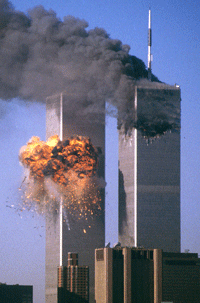What was the appropriate response to the attacks of 9/11? Less than a month after the collapse of the World Trade Center, J. Bryan Hehir outlined the pastoral, social and policy responses necessary to meet the challenges of the post-9/11 world. Father Hehir called the policy response the most difficult of the three. "A measured response to transnational terrorism cannot be primarily a military response," Father Hehir wrote. "Deeper issues than the use of force lie beneath terrorist actions."
What Should Be Done?: From October 8, 2001
The latest from america
Pope Leo said that if the teen “had come all the way to Rome, then (the pope) could come all the way to the hospital to see him.”
A Reflection for Tuesday of the Eighteenth Week in Ordinary Time, by Molly Cahill
As emergency workers searched for survivors and tried to recuperate the bodies of the dead, Pope Leo XIV offered his prayers for people impacted by the latest shipwreck of a migrant boat off the coast of Yemen.
The Archdiocese of Miami celebrated the first Mass for detainees at “Alligator Alcatraz,” the Trump administration’s controversial immigrant detention center in the Florida Everglades.









In those early days, it was not so obvious that these attackers not only were attacking the US but were attacking the very legitimacy of the effort to limit war to state actors. To a certain extent, they have succeeded in legitimizing non-state warfare again. Taking up the problem of non-state warfare, especially when we have a major GOP candidate who is championing it (Dr. Ron Paul's 2001 and 2007 bills on reinvigorating letters of Marque and Reprisal) is something that could not have been realistically covered in 2001 but would have been a timely effort in these days. Well, maybe next year.